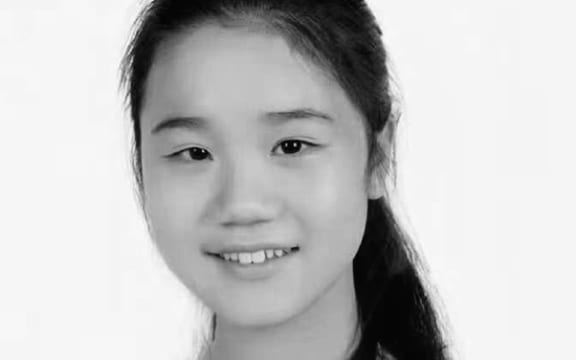
Yuzhang Wu, pianist. First prize and Junior Jury winner at the 2023 National Concerto Competition. Photo: Supplied/publisher
Yuzhang Wu, piano
First prize winner at the 2023 National Concerto Competition in Christchurch
Adjudicators Terrence Dennis from Otago University and Glenn Riddle from the Melbourne Conservatorium of Music awarded Yuzheng first place for her accomplished performance of Rachmaninov's Rhapsody on a Theme of Paganini.
Yuzheng was also given the Junior Jury's Prize by the competition's jury made of young pianists.
Yuzhang Wu is a 15-year-old student in Pinehurst School. She began studying piano at the age of five. Since the beginning of 2017, she has been under the tuition of Jian Liu and Bryan Sayer.
In 2019, Yuzhang won the 1st prize at the 3rd Zhuhai International Mozart Competition for Young Musicians in China, giving her a chance to perform Mozart Piano Concerto KV 414 with the Salzburg Chamber Soloists. She is a frequent winner of local music competitions, including Overall Winner of Ara Lodge (APPA) Music Awards in 2017, Pacific International Music Competition for Youth, the Norah Howell Recital in 2022, Josephine Burry Concerto Prize from 2019 - 2022, and the Margaret Doone Memorial Piano Sonata Scholarship. She is the recipient of the Junior Excellence Awards in Music by AIMS 2020 and the Alice Cole Piano Scholarship in 2022, as well as being a Chiron Scholar in 2021 and 2022.
As a young pianist Yuzhang is a frequent soloist with local and international orchestras. She was invited to perform a recital and concerto as a Laureate in Junior Piano Invitational Showcase as part of the Concours Musical International de Montreal 2020. Yuzhang has also toured with the APO (Auckland Philharmonic Orchestra) Chamber Orchestra as a soloist performing Mozart Piano Concerto KV414 at the Eurochestries Festival held in Qingdao China in 2018. In the same year, she performed the Grieg Piano Concerto in A minor with the Chamber Orchestra in Tianjin Grand Theatre and as well in the Auckland Town Hall. In 2020, Yuzhang performed Saint Saëns Carnival of the Animals with the APO in Auckland Town hall. Most recently, she had the chance to perform Beethoven’s Piano Concerto no.3 with the NZSO at the Young Artists Showcase 2022.
Yuzhang is also an active cellist in Pinehurst School Orchestra and passed ABRSM Cello Grade 8 with high distinction in 2020. Besides music performance, Yuzhang likes reading and debating.
I was learning the Rachmaninoff Rhapsody on a Theme by Paganini, a gorgeous and captivating Concerto, I thought, “why not put it in the National Competition?” One of the most prestigious competitions in New Zealand is the National Concerto Competition. The chance of performing one of my favourite concertos with the Christchurch Symphony Orchestra was simply too tempting to resist. Before learning this piece, I was looking into solo piano works by Rachmaninoff, such the Preludes and Etude Tableaux. By coincidence, I heard the renowned Variation 18, which captivated me in right away. The more I listened, the more appealing it became.
- Yuzhang Wu
Sergei Rachmaninoff
Rhapsody on a theme by Paganini, Op. 43
Twenty-four variations
Performed by Yuzhang Wu (piano) with the Christchurch Symphony Orchestra, conducted by Benjamin Northey in the Douglas Lilburn Auditorium of the Christchurch Town Hall, 18 March, 2023
The world premiere of the Rhapsody took place on November 7, 1934, in Baltimore, with Rachmaninoff performing the solo part and Leopold Stokowski conducting. The following month, Rachmaninoff performed it in New York under the baton of Bruno Walter. A triumphant tour of the USA and Europe followed. The Rhapsody went straight into the standard repertoire and has remained one of the most popular piano and orchestra compositions of the twentieth century ever since.
Of course, Paganini wrote many themes, but one in particular has remained a recurring fascination for other composers: the 24th and final of his Capricci for unaccompanied violin (itself a set of variations). Fiery, brilliant, articulating a simple but beautifully-balanced harmonic structure that begs for continuation and metamorphosis. In the nineteenth century, it was taken up by Schumann, Liszt, and Brahms, and the process has continued vigorously since Rachmaninoff at the hands of composers such as Blacher and Lutoslawski.
Despite the title ‘Rhapsody’, Rachmaninoff’s work is a straightforward set of 24 variations, the majority of which adhere strictly to the theme. We begin with the first variation, which Rachmaninoff marks ‘precedente’. The orchestral violins appropriately state Paganini’s theme; the piano only takes over the tune with the subsequent variation 2. Rachmaninoff groups his individual variations into larger units, articulating broad paragraphs of his work’s overall form. So, after the theme, there are four variations (2-5) that form a toccata-like Allegro.
With variation 6, the piano introduces the broad, solemn theme of the Dies Irae plainchant, a tune that had haunted Rachmaninoff his entire life. The dark Chopinesque ruminations of variation 17 introduce variation 18, one of Rachmaninoff’s most famous melodies, but closely derived from the Paganini theme - largely turned upside-down. This melody is transformed into a miniature slow movement, with the piano having the final quiet word.
Variation 19 marks a big change into the highly technical drama of the whole piece. This variation, Rachmaninoff explained, “is Paganini’s triumph with his diabolic pizzicato.” The last variation serves as a monumental finale to the entire composition. The orchestra and piano both cascade into a thunderous crescendo (where Dies Irae makes a last appearance in full force), yet there is no tremendous, full-orchestra chord to finish the composition. Instead, the piece concludes with a last moment of cunning and wit from the piano alone.

